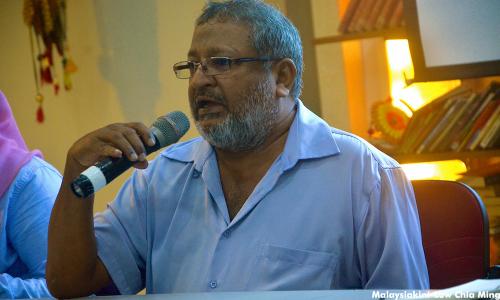Dr M's 'Malaysians don't want to work' remark irks Penang MTUC
Prime Minister Dr Mahathir Mohamad's remark that Malaysian workers don't want to work has irked the Malaysian Trade Union Congress (MTUC), which say it abhors such a view.
MTUC Penang division secretary K Veeriah (photo, above) said Mahathir's remark was a "sweeping" statement devoid of any substantive evidence.
Describing the remark as demeaning, Veeriah said statements such as "Malaysian Workers don't want to work" that was attributed to the prime minister is an insult to the contribution of the working class who built the nation's economy and continue to be the backbone of our nation's progress, economic or otherwise.
He said if the prime minister had confined his statement to the unwillingness of Malaysians to work in the plantation sector, the question will be on the stagnation of wages.
"If Vietnamese and Indonesians have decided not to work in Malaysian plantations because wages in their countries are comparable to what our plantation owners pay, then the big question is whether wages, in the Malaysian plantation sector, has stagnated in comparison to wage empowerment in those countries, " Veeriah said in a statement, adding that the answer in MTUC's opinion is a big yes.
On June 29, Mahathir said he found there were many people in Malaysia and there was no need to bring in foreigners.
"But Malaysians don't want to work. Since they don't want to work, we have to give it to other people," Mahathir was quoted by The Star.
The Langkawi MP was responding to Human Resources Minister M. Kulasegaran remark that he had been in discussion with several ambassadors from Africa over the issue.
Due to unattractive salaries here, Kulasegaran said the plantation sector was having trouble recruiting workers from Vietnam and Indonesia.
Veeriah said there is an adage which states "look before you leap" but sadly Kulasegaran gave no attention to it when he elected to subscribe to the plantation owners' call for exploring the possibility of hiring workers from the African continent.
Kulasegaran has since backtracked on the issue at the behest of his "supreme leader".
"Consequentially, what needs to be examined is the issue of living conditions and wage levels in the plantation sector that would attract our workers to seek employment in the sector.
"Until and unless wages and living conditions in the plantation sector are set at a conducive level, we will never be able to draw our labour force to fill the optimum labour requirement," Veeriah.
Veeriah reminded Pakatan Harapan of its pledge to implement a monthly wage of RM1,500 for workers in the country.
He admitted that the amount is not an appropriate rate according to Bank Negara Malaysia.
"In fact, Bank Negara recommends we move towards a living wage module, which means having sufficient income for a worker to meet basic economic needs and a little bit to spare," Veeriah said.
He urged the government to pursue labour centric reforms, be it empowerment of wages, enhancement of working conditions or objective labour law reforms with regards to universally accepted labour standards.
Veeriah said issues related to the working class struggle, ought not to be viewed in a tunnel vision.
RM12.50 / month
- Unlimited access to award-winning journalism
- Comment and share your opinions on all our articles
- Gift interesting stories to your friends
- Tax deductable
